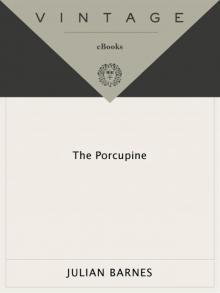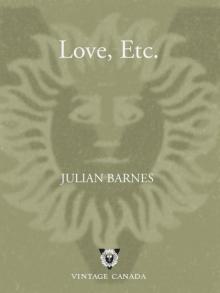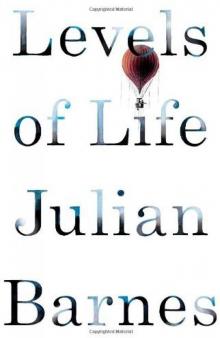- Home
- Julian Barnes
Something to Declare Page 27
Something to Declare Read online
Page 27
Of course, dividing characters into “major” and “minor” is a critical simplification. There are major, minor-major, major-minor,and minor characters (to propose another simplification). And within what we choose to call the minor characters there are quite different grades with quite different functions. There are those like Dr. Larivière who make a single, splendid cameo appearance: three pages of existence as a deus ex machina (except that modern gods do not save any more, and cannot even help; they merely judge, and move on). There are those, like Binet, who are as lavishly characterized as Larivière but whose appearances are intermittent and recurrent, and whose function is more indirect and enigmatic; Binet and his lathe are a sort of droning reminder of transgression in the novel, a moral tinnitus in Emma's ear. And then, at the bottom of the heap, both socially and—it seems—novelistically, there is a character like Justin, whose appearances are tiny and fleeting. Unlike Larivière or Binet, Justin is granted no character-description; it is easy for the reader to ignore him, just as his social superiors in Yonville do; he is only what happens to him. Yet what happens to him, in his disregardable moments of fictional existence, is crucial.
Justin is, primarily (and concludingly), the solution to a narrative problem Flaubert must have faced early in the writing of the novel. Emma is going to die at the end of the book: she is to be a suicide by arsenic poisoning. She could, no doubt, have died in other ways, by rope, gun, or knife; she could, given Flaubert's notorious loathing of the railways, have preceded Anna Karenina as an early track victim, had Flaubert not set his story just before the coming of railways. The fact that Emma's predecessor in life, Delphine Delamare, also took poison should make it less, rather than more, likely that Flaubert would choose the same method for doing in his own character.
But there is a particular appropriateness about arsenic poisoning, since it inflicts the worst torments on the body of a woman who has, in the course of the novel, used that body for scandalous and transgressing pleasure. (No authorial judgement is implied here, merely aesthetic balance.) But if Emma is to swallow arsenic,how is she to get it? She could go into Rouen and shop for it: too boring, and perhaps too difficult—there might be a poisons register to sign. Also, too calculated and time-consuming, since the plot at this point must move headlong, just as Emma herself does. Could she bribe, or perhaps blackmail, Homais? Possible, but unlikely given Homais's established character: she'd just end up with a moral earful. Flaubert's solution, and it is a brilliant one since it combines narrative economy with psychological complication, is to use Justin, and to use him in a particular way. When he leads Emma to the arsenic jar, it is the climax to his traditional minor-character function as domestic facilitator; but on the way there, his every act of facilitation turns out to be double-edged, quietly freighted, allusive.
Justin makes no more than a dozen appearances in the novel; he is such a wisp of a character that he only gets to speak on two occasions. He is, nevertheless, one of the novel's key indicators, the canary found with its feet in the air on the floor of the cage. To string his appearances together inevitably has the effect of making Flaubert's use of him seem more obvious and less delicate than it is; though it won't make it seem less brutal. Madame Bovary is a novel about corruption—moral, financial, social, sexual, even sartorial (in the dandification of the mourning Charles). Justin's story is one of almost unnoticeable and yet savage corruption: nowadays the social workers might have been called in.
Justin is the pharmacist's assistant, a distant relation of Homais, who takes him in out of charity and thereafter treats him with relentless lack of charity. The boy's age is never given, nor do we know what he looks like. However, we know that he is old enough to have started noticing that the world is divided into two sexes. He hangs about the Bovary household, initially attracted— at least according to Homais—by Emma's servant Félicité. This sentimental or pre-erotic inclination explains his presence on the day Rodolphe brings along one of his workers to be bled. This is the first encounter between Emma and her future lover; and it is also the first time Justin is seen in Emma's presence. He is ordered to hold the bowl while Charles wields the lancet. Blood spurts, the bowl trembles, Justin faints. Whereupon this happens:
Madame Bovary began to loosen his cravat. There was a knot in the strings of his shirt; her fingers played softly with the boy's neck for a few minutes; then she moistened her batiste handkerchief with vinegar and dabbed his temples, blowing softly as she did so.
All very normal and housewifely, of course; yet Justin (though he is unaware of it) is virtually in Emma's arms, and she is beginning to undress him. The moment seems completely incidental: the main function of the scene is to bring Emma and Rodolphe together, to display Emma as capable and sexually attractive to Rodolphe, and to display Charles as a clumsy doltish fellow who deserves to be cuckolded. Yet Justin is there at this prime moment, and Justin is the one receiving the sub-erotic attention. Homais, who is also there, bawls out his apprentice for fainting. He does this in a manner which, while entirely consistent with his unsubtle nature, is also significantly out of proportion to the event itself. Justin must learn to behave as a man, because one day “you might have to give evidence in court, in a serious case: the magistrate might need your expert opinion.” This is pompous hyperbole; at the same time, Homais unwittingly underlines the scene that has just finished. Its subtext could not be clearer: Blood, Sex, Crime.
From this moment, Justin's fate is bound up with that of Emma. At first, his role seems to be as a fleeting witness to transgression: his next appearance, for instance, occurs when Emma goes out riding with Rodolphe—the occasion on which they first become lovers. Justin slips out of the pharmacy to watch them go. Homais comes out after him, and like some pocket Polonius offers redundant advice to the departing riders: “Un malheur arrive si vite! Prenez garde! [etc.].” Polonius, we remember, was not always wrong.
By the time of his next appearance, however, Justin has moved from observer to complicit participant: he is Emma and Rodolphe 's go-between, carrying letters from one to the other. There is no ponderous setting-up of this fact, no “Justin, I'll give you a couple of sous if you take this note, and I'm sure I can trust you to keep quiet,” just the established fact that he is now her servant, and one whose silence can be relied upon. In a sense, of course, nothing has happened: a boy is taking on some extra errands, a boy who is, in any case, still apparently hanging around Félicité, for here he is in the Bovary kitchen watching her do the bleaching and ironing. What could be more innocent, more domestic, more casual? Except that Félicité just happens to be washing Emma's underwear, and so—in a reversal of that first scene—Justin now becomes acquainted with Emma's intimate garments. He gazes at her petticoats and knickers, runs his fingers over her crinoline, touches its fastenings. He asks Félicité what things are for, and she chases him away.
In parenthesis, the servant Félicité has her own story, both inside and outside the novel. Inside it, she suffers the contagious influence of her mistress, corrupted into indolence, sexuality, and crime. Outside it, she provides one of the great rebukes made by real life to imagined literature. Delphine Delamare killed herself in 1848; Emma died (in the first edition, anyway) in 1857; Flaubert himself in 1880. A quarter of a century later, Delphine Delamare's original servant was amazingly still alive and giving interviews. “Félicité,” or rather Augustine Ménage, was then 79, and still had—or claimed—vivid recall of the original events. In 1905 she described the real-life poisoning of 1848 in some detail, and told the interviewer in conclusion: “Oh, it was all a great deal sadder than in the book!”
So Justin is already an intimate in Emma's household. He facilitates her adultery; he also helps cover it up, by cleaning the mud from her boots. This is a moment of particular complicity: first, he is destroying the evidence of Emma's early-morning tramps to Rodolphe's house by removing what Flaubert straightforwardly calls “the mud of her assignations”; second, Justin is presumably— though
we are not given a description of his shoe-cleaning technique—placing his hands where Emma had placed her feet. Normal enough, of course; but there is a strong, some would say fetishistic element of podophilia in Flaubert, also in the novel, and here Justin is awarded his momentary share.
When Emma's affair with Rodolphe is terminated, she has a nervous collapse. Who is her regular visitor as she recovers? Justin. He comes with the Homais children and stands just inside the door, silently watching the convalescent:
Often Madame Bovary would start to dress, as if he wasn't there. She would begin by taking out her comb, and shaking her head sharply; and when for the first time he saw the mass of black hair unroll down her back as far as her knees, it was, for the poor boy, like the sudden entry into something new and extraordinary, whose splendour terrified him.
By his constant, faithful attendance Justin suggests that, unlike Rodolphe, he will not forsake Emma; further, he is permitted that most intimate of male sights—of a woman letting down her hair—which would normally have been reserved for husband or lover. Once more, nothing has really happened: Emma does not even notice Justin. But on the other hand, his surrogacy as a lover has almost been achieved, and the prose points us to it with the phrase “sudden entry” (l'entrée subite).
With these few, tiny scenes, the sub-plot is primed and cocked, ready for Emma's second affair to fail, for her despair, her ruin, her suicide. Justin, for his part, is as potentially lost as any doomed lover. He is also as sex-crazed as any normal adolescent; Homais discovers him with a dirty book in his pocket. It has the pointed title of Conjugal Love. “And with pictures!” as the outraged pharmacist observes. Justin has also, we learn, asked Emma to take him into her service. Again, we are not given Justin's inner life, only a fleeting outer confirmation of what is already in place: a devotion,and a powerful sexual thrall, which sets up Justin's final and fatal participation in the plot. Emma, bent on suicide, demands from Justin the key to the laboratory, lies to him, overrules his protests, hustles him to what she seeks, and swallows a handful of arsenic. Naturally, we have eyes mainly for Emma at this time, so there are two aspects of Justin's story, rather than hers, which we might easily overlook.
The first is that though Emma is desperate, humiliated, ruined, and outcast, “She seemed to him extraordinarily beautiful, and as majestic as an apparition.” At this climactic moment Flaubert—for the first and last time—inserts us directly into Justin's head. Briefly, we both see and hear as he does. And what does he hear? Emma speaking in a whisper, “in a gentle, melting voice.” This is the only occasion in the novel when Emma speaks to Justin. This is a gauge of how brutal Justin's story is: he is in thrall to Emma, she never notices him, and his only use in her eyes is to enable her to kill herself. Imagine having that on your emotional record.
And the second aspect of this fatal scene is that it involves going upstairs. Emma leads, Justin follows, and they go upstairs together. In other words, the seduction is complete—that parallel, metaphorical, extended, unrealized, and often unnoticeable seduction, which reveals the fanatical care with which Flaubert composed his novel.
Justin has fulfilled his function. Will he be punished for his crime of aiding and abetting suicide, will magistrates need his expert opinion, as Homais predicted? It doesn't matter, because the real punishment, the real damage, lie elsewhere, and Flaubert wisely discards this legal side-issue. But he hasn't quite finished with Justin. At the lunch Homais gives for Dr. Larivière, there is a crafty—and crafted—repeat of that early image of Justin with the bowl of blood. This time he is holding a pile of plates. Homais wonders aloud where Emma might have got the arsenic. Justin begins to tremble, as before, and this time he drops the plates.
He is glimpsed three times more as Flaubert gives final shape to his novel. When Emma's funeral procession leaves the church,Justin appears at the door of the pharmacy: that's to say, he is watching her go on her final journey from the same spot from which he watched her set off to begin her adventure with Rodolphe. Emma is buried; later that night, with the village dark and silent, Flaubert lists those awake and those asleep. Emma's two faithless lovers, Rodolphe and Léon, are both out for the count; her two faithful lovers are still awake—Charles in his bed, Justin at her graveside, his heart “overflowing with a grief that was as tender as the moon and as unfathomable as night.” Finally, we learn, as if by afterthought, that Justin has run away from Yonville, run away to Rouen where he has become a grocer's boy. But this is much more than an afterthought: it's a reminder that Justin was a stranger to the village in the first place. He was taken in by Homais out of charity; and charity was the thing he failed to discover in Yonville. He arrives, he suffers, he flees: his time in Yonville is framed into an enclosed and traumatizing period.
One of the great leaps forward in opera was when recitative-and-aria gave way to through-composition. Something similar happened to the novel during the nineteenth century. It's instructive to read Madame Bovary side by side with Middlemarch. Both are novels of provincial life set back in time, one with the subtitle Moeurs de province, the other with the uncannily similar “A Study of Provincial Life.” Both are written with the keen sense that, as Eliot tells us on the last page of Middlemarch, the heroic age is past; both are works of powerful psychological insight; both are, for want of a better phrase, great novels. But the surprise, looking back from this distance, is that Madame Bovary was published in 1856–7 and Middlemarch in 1870–1. In terms of fictional technique, Flaubert is far more sophisticated; Middlemarch reads like the novel of an earlier generation. Eliot holds our hand and directs our eye, and offers herself as a strong and opinionated authorial presence; Flaubert leaves us alone to find our own bleak way through his constructed universe. Eliot throws down her narrative in great blocks, side by side; Flaubert's narrative is through-composed.
There are many different (and conclusive) answers to the question, Why is Madame Bovary the first modern novel? One short way of answering is to say: Look at Justin. His is a tiny and unnoticed story as far as everyone in Yonville is concerned; yet one which, if we notice it, is shaped with as much care as any larger story in the novel. Justin's brief erotic tragedy goes as unnoticed in Yonville as Emma's erotic tragedy goes unnoticed in the wider world. He is an echo of her, that perfectly placed bit of kindling which makes Emma's story blaze the brighter. To change the metaphor: if Madame Bovary were a mansion, Justin would be the handle to the back door; but great architects have the design of door-furniture in mind even as they lay out the west wing.
Acknowledgments
Original versions of these pieces appeared as follows:
Richard Cobb: New York Review of Books, 12 August 1999.
Georges Brassens: Picador zi (Pan Books), 1993.
Truffaut: New York Review of Books, n October 1990.
Elizabeth David: The New Yorker, 21 September 1998.
Edith Wharton: Preface to A Motor-Flight Through France (Picador), 1995.
Tour de France: The New Yorker, 21/28 August 2000.
Simenon: Literary Review, April 1992.
Baudelaire: New York Review of Books, 20 November 1986. Courbet: New York Review of Books, 22 October 1992. Mallarmé: New York Review of Books, 9 November 1989.
Lottman: London Review of Books, 4 May 1989. Vargas Llosa: New York Times Book Review, 21 December 1986. Sartre: London Review of Books, 3/16 June 1982.
Rage and Fire, a Life of Louise Colet, by Francine du Plessix Gray, New York Review of Books, 26 May 1994.
Flaubert, Correspondance III, 185g–1868 (Gallimard), Times Literary Supplement, 6 September 1991.
Flaubert and Turgenev, A Friendship in Letters (Athlone), London Review of Books, 23 January 1986.
Flaubert-Sand: The Correspondence (Knopf), New York Review of Books, 10 June 1993.
Flaubert, Correspondance IV, 186g–18j5 (Gallimard), Times Literary Supplement, 18 December 1998.
Flaubert, Carnets de Travail (Balland), Times LiterarySupplement, 7/13 Oct
ober 1988.
Chabrol: Writers at the Movies, edited by Jim Shepard, HarperCollins (US), 2000.
Justin: “The Process of Art,” Studies Offered to Alan Raitt(Oxford), 1998.
Copyright ©2002 by Julian Barnes
Vintage is a registered trademark and Vintage International
and colophon are trademarks of Random House, Inc.
Barnes, Julian.
Something to declare: essays on france / Julian Barnes.
1st ed.
New York, NY: Alfred A. Knopf, 2002.
p. cm.
2002109567
eISBN: 978-0-307-54710-1
www.vintagebooks.com
v3.0

 The Sense of an Ending
The Sense of an Ending The Noise of Time
The Noise of Time Metroland
Metroland Letters From London
Letters From London Before She Met Me
Before She Met Me Pulse
Pulse Flaubert's Parrot
Flaubert's Parrot England, England
England, England The Porcupine
The Porcupine The Only Story
The Only Story Love, Etc
Love, Etc Through the Window: Seventeen Essays and a Short Story
Through the Window: Seventeen Essays and a Short Story Staring at the Sun
Staring at the Sun Cross Channel
Cross Channel Levels of Life
Levels of Life Arthur & George
Arthur & George Love, Etc.
Love, Etc. A History of the World in 10 1/2 Chapters
A History of the World in 10 1/2 Chapters Something to Declare
Something to Declare Through the Window: Seventeen Essays and a Short Story (Vintage International)
Through the Window: Seventeen Essays and a Short Story (Vintage International)